Dick Krzywicki: The Auschwitz survivor's son who played for Wales
- Published
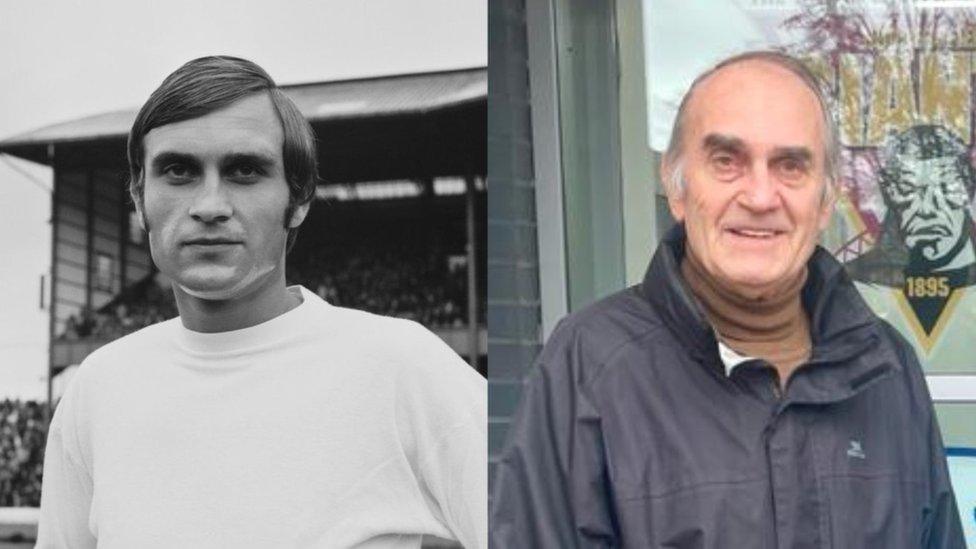
When Franciszek and Anna Krzywicki left Italy for Britain in 1946, little did they imagine that they would have a son who would one day play international football for Wales.
The young Polish couple were living in Italy at the end of the Second World War, having being repatriated there following the Allied liberation.
Franciszek had ended up in the Auschwitz concentration camp during the war, whereas Anna was taken by the Nazis from Poland to work on a farm in Austria.
The Red Cross helped the pair relocate to Britain, and a year later, in February 1947, their son Ryszard (Dick) Lech Krzywicki was born in Penley, near Wrexham.
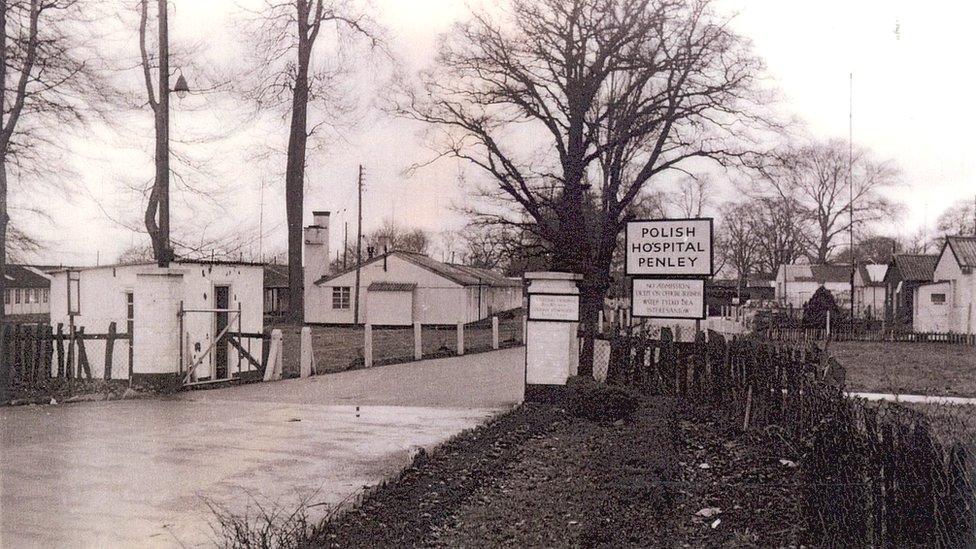
The Polish Hospital at Penley near Wrexham where Dick Krzywicki was born
Dick Krzywicki explains how he became Welsh-qualified: "The reason I was born in Wales is because there was a Polish hospital in Penley at the time, and a lot of the Polish women who were pregnant were sent there.
"We lived in a place called Blackshaw Moor Camp between Leek and Buxton - it was a camp where Polish people were living following the war."
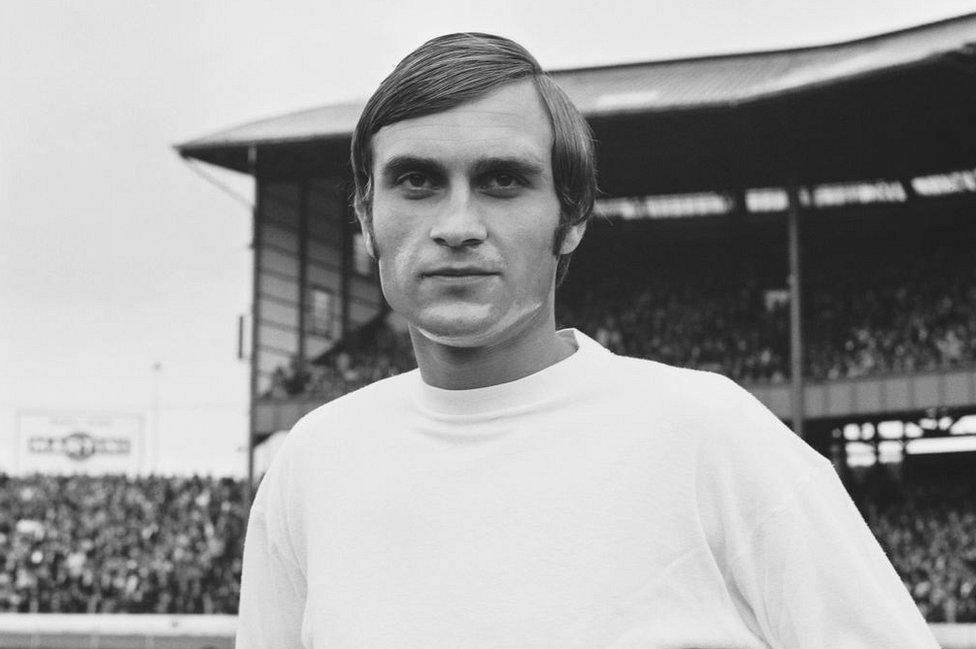
Representing West Bromwich Albion in 1968
Dick's father was a soldier in the Polish Army, but following the occupation he was arrested by the Nazis and sent to a concentration camp.
"As I understand it, he is supposed to have had a gun in his possession," said Dick.
"He was a builder and he put this gun in a wall and blocked it all up, and that's the reason he got picked up. He was sent to Mauthausen Concentration Camp at first, but he later ended up in Auschwitz.
"My mother was taken by the Germans as a 16-year-old, and taken to Austria to work on a farm because her parents were living on a farm in Poland.
"She was taken off the street and they said 'get your belongings, you're going away'."
'Fantastic surprise'
Whilst growing up Dick maintained a strong Polish identity, with language central to it all.
"When I was younger I used to speak fluent Polish because I used to go to church and then Polish lessons that followed," he added.
"Then I left home at 15 to go to West Brom, and being away from my parents made it difficult.
"I got married, and so I lost a lot of the language as I wasn't speaking it."
It was at West Brom where Dick made his professional debut as a 19-year-old in 1966.
"I got a nice surprise when I was playing for West Brom," recalls Dick.
"The manager came over to me and said that the Welsh manager, Dave Bowen, wanted to speak to me.
"He said he'd like me to come and play for the Under-23s. I was absolutely shocked but it was a fantastic surprise, so of course I said yes."
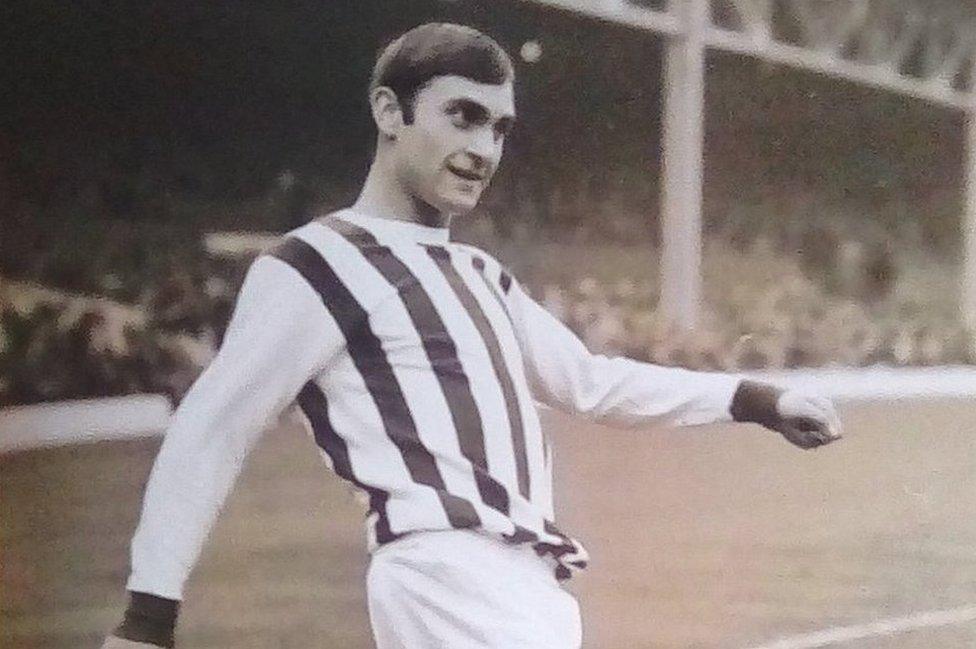
Krzywicki was with West Brom between 1964 and 1969, before moving to Huddersfield Town
But the Polish Football Association had also become aware of Dick's talents.
"When I was with West Brom we went to America to play in a pre-season competition against three or four sides," he recalls.
"As we were on the way back we were at the airport and the Polish national team was there.
"They found out I was there with West Brom and five or six of them came over and fired questions at me, about my wages, what it was like in the English league, and whether I'd like to play for Poland.
"I think the official approach was made following that incident."
But Dick was determined to play for Wales, and his senior debut came on 29 October, 1969, in a 1-3 loss to East Germany in Cardiff.
"I remember bits of it, but with it being your first cap you just wanted to get it over with because you didn't know what to expect.
"But it was just a fantastic experience."
The following year Wales welcomed world champions England to Ninian Park and the game ended in a 1-1 draw with Dick scoring Wales' goal.
"That was my highlight of my career. Everywhere I go, especially when I'm on holiday in Wales, there are people in their 60s and 70s remembering me for scoring against England," he said.
"With them being world champions and with Gordon Banks in goal as well, it was extra special."
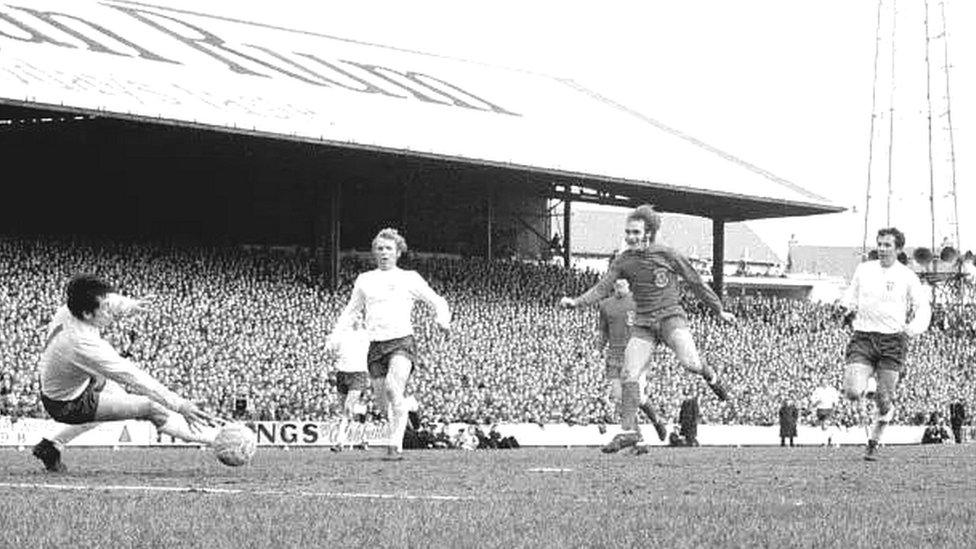
'The highlight' of his career - scoring past Gordon Banks at Ninian Park
On 26 May 1971, Dick played for Wales alongside another player of Polish descent.
Caernarfon-born Ray Mielczarek was in the team that beat Finland in Helsinki that night thanks to a John Toshack goal.
Dick and Ray also played together in the same Huddersfield Town team in the early 1970s.
The memorable surname
Reflecting on his distinctly Polish name, Dick says: "The name is like a gimmick to me, because there aren't many Krzywickis who play for Wales!
"Wherever I meet football fans there are those who remember the name.
"I was staying in a hotel once and someone said 'ah I remember someone with that name playing football for Wales'... so it's nice to still be remembered."
Krzywicki now lives on the outskirts of Huddersfield with his wife Hazel, whom he married in 1969.
He played in Huddersfield Town's midfield between 1970 and 1974, before finishing his career with two seasons at Lincoln City.
"I always said after I finished playing that I'd move back to Huddersfield as I made a lot of good friends here, and I've been here for 50 years," he added.
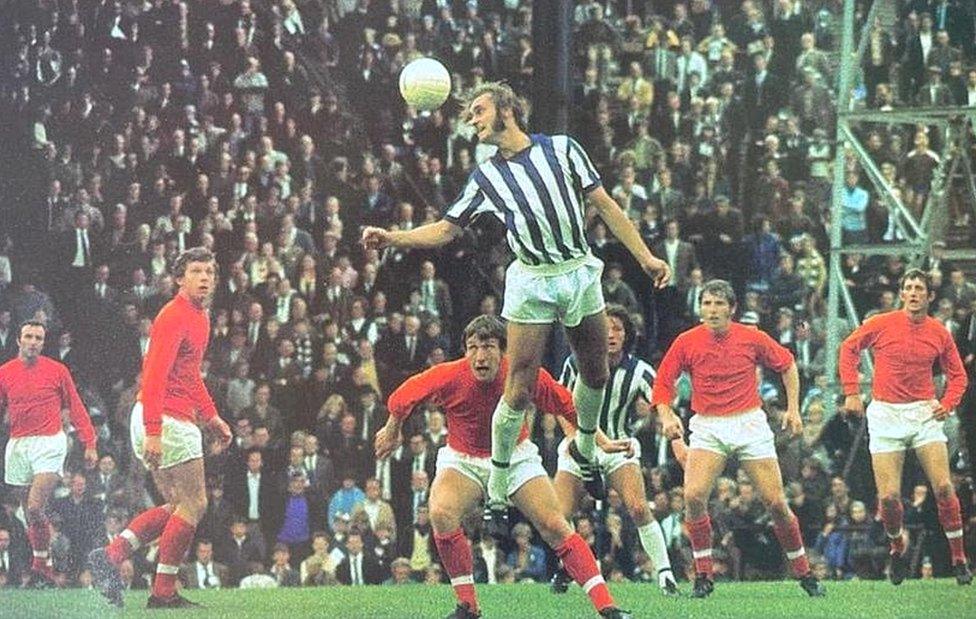
Playing for Huddersfield Town against Blackpool
Dick's children also excelled in sport, with daughter Tara gaining six international football caps for Wales, whilst also being an athlete representing Great Britain in the 5,000m and a steeplechase horse rider.
Son Nick is a professional golfer, based in Halifax.
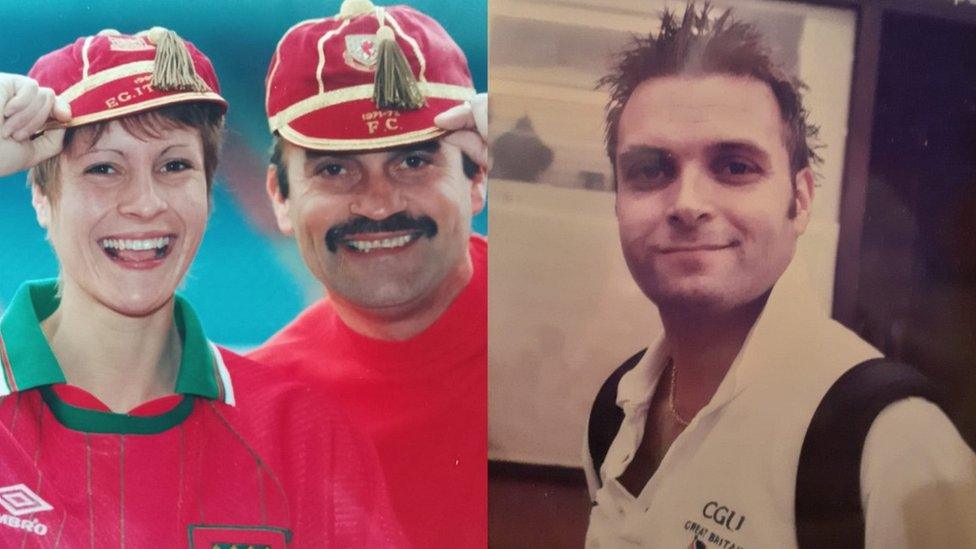
Dick with his daughter Tara, winning her first cap for Wales, and his son Nick, who's a professional golfer
"We are a sporty family. The wife says she is too, but I tell her line-dancing don't count," Dick jokes.
'I'm always Wales'
When Wales face Poland, the land of his parents, in Tuesday's Euro 2024 play-off final, will Dick have any split loyalties?
"I've been asked that a lot, and no there isn't, I'm always Wales," Krzywicki insists.
"But when Poland play other teams I back them as I have an allegiance to them.
"I think personally that Wales have the stronger side. As much as I like Poland, I don't think they have the strength. I honestly believe it'll be close, there won't be many goals in it."
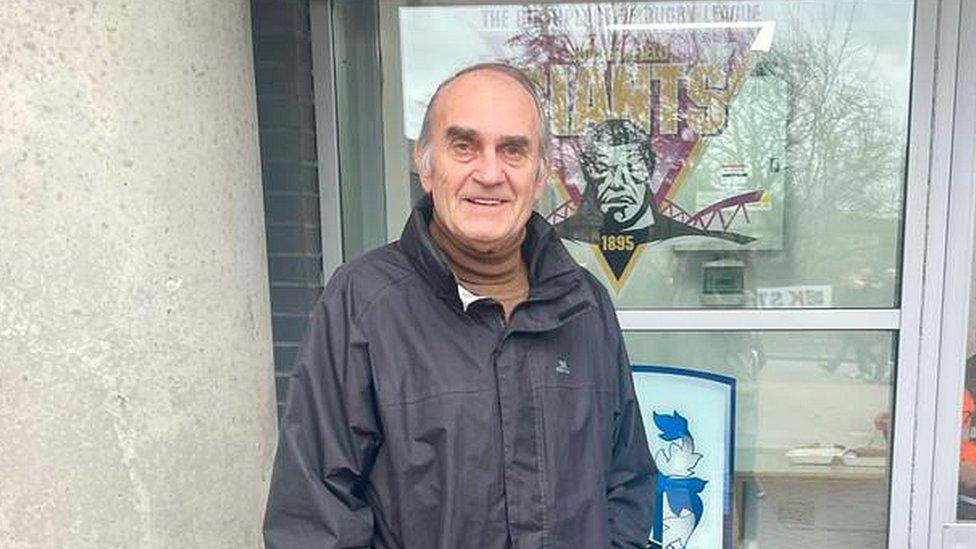
Dick Krzywicki attending a Huddersfield Town game
Reflecting on his humble beginnings and his parents' struggles, 77-year-old Krzywicki is extremely grateful of the chances that came his way.
"It's a dream come true," Dick says.
"I never thought I'd be a pro, although I was head and shoulders above others at school football.
"I almost signed up to be a motor mechanic on leaving school, but all of a sudden I had that approach by a local scout to go to West Brom.
"I sometimes kick myself and think how lucky I've been. It's been a success story and I look back and think what a lucky boy I've been."

INSEPARABLE SISTERS: The seven-year-old conjoined twins who defied all odds
JUNE: VOICE OF A SILENT TWIN: The tragic story of June, her sister and their life in Broadmoor
